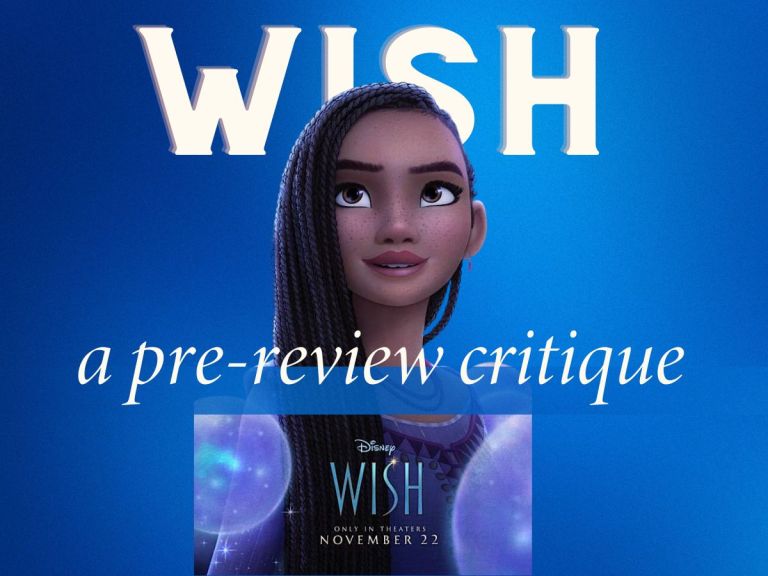How is a piece of art so bad that entire TikTok communities came together to condemn it even before its release? Apparently, for Disney’s “Wish,” all it took was a sneak peek of Chris Pine’s villain song.
“Wish,” set to release on Nov. 22, is a Walt Disney Animation Studios film telling the story of Asha (Ariana DeBose) in her quest to save her kingdom from the evil King Magnifico (Chris Pine) through the power of wishes. A promotional snippet of “This is the Thanks I Get,” the king’s villain song, was uploaded to Disney Animation’s TikTok account on Oct. 25 and soon sparked social media backlash.
On TikTok, nearly every video using the sound features a complaint about the downfall of Disney musicals or the degraded quality of villain songs. Users expressed that the song reeked of Kidz Bop and that Disney productions used to be better.
Is the online community justified in its critique of “Wish”? I argue that their complaints are valid.
Few artistic styles are as intimately familiar to the general public as the Disney animated musical. The late Howard Ashman, already a prolific Broadway lyricist, first advocated for the adaptation of musical theater for the screen in the form of an animated princess movie in 1989.
Thus, “The Little Mermaid” (1989) as we know it was born. Ashman and his writing partner, Alan Menken, transformed the traditional structure of the film. For the first time, a Disney animated feature included a number of songs fluidly integrated with the plot and characters, just like musicals had been for decades. These included tune archetypes that would become staples of ’90s Disney, like “Princess Sings About Her Hopes and Dreams,” “Villain Tells You Their Plan” and “Side Character Production Number.”
Previous Disney movies primarily featured love songs, often sung by an offscreen narrator or chorus. In the Ashman and Menken films, characters sing to each other and the audience in musical theater-esque moments.
Part of the beauty of “The Little Mermaid” is its riskiness. Disney had never made a movie so clearly inspired by the musical theater format. It had also never centered a young female protagonist so aggressively. Ashman even incorporated a drag queen-inspired Ursula the sea witch.
Now, Disney is taking fewer and fewer artistic risks. We moved from an octopus drag queen, a literally flaming Greek god (in “Hercules”) and a sexually repressed judge (in “The Hunchback of Notre Dame”) to a much tamer, blander villain in King Magnifico.
People can tell “Wish” feels corporate and lifeless in comparison to the more vibrant, engaging stories of the ’90s and beyond. It isn’t the songs and villain alone that feel bland. The protagonist princess Asha is being disparaged for having the same cute, quirky personality as Rapunzel, Anna and Mirabel before her.
For me, “Wish” is troubling because its music resembles pop songs and other recent Disney films. The lack of originality in new Disney numbers has been evident ever since Disney hired Broadway superstar Lin-Manuel Miranda as one of its recurring composers.
Miranda’s compositions feature artistically risky numbers such as Awkwafina’s atrocious, pace-demolishing rap from the live-action “The Little Mermaid” (2023). However, as Miranda’s quirks are seeping into the Disney universe more and more, they are making Disney films into a jumbled and indistinguishable musical landscape.
Disney musicals have always had a signature sound. This is partially a product of Menken’s habit of reusing familiar musical motifs; give a listen to the opening number to the TV show “Galavant” and try to tell me it doesn’t sound exactly like “Beauty and the Beast” (1990). But Menken’s signature sound and orchestrations can be adapted to fit the varied settings and archetypes for which he writes. As a result, Menken-era Disney musicals sound unique, almost like they belong to their own genre.
Now that Disney movies are being made with songs that can be adapted for TikTok trends, Ashman has to be rolling in his grave. Under Ashman’s helm, Disney films thrived on specificity and character development through music and lyrics, not snippets that can be shoehorned into a 15-second clip.
I’m not trying to say Disney should stick to just hiring Alan Menken and his lyrical collaborators. However, I don’t believe that the creative team for “Wish,” composed of singer-songwriters responsible for Justin Bieber hits, will produce artistic products that are up to the standards this studio has set. Diverse artistic perspectives have generated really stellar Disney productions in the past, such as Miranda’s “Moana” (2016) and “Coco” (2017). The materials that have been released suggest that the team for “Wish” so far has not measured up.
Disney’s recent corporate risk-aversion has created a bleak landscape of pop and repetition. Without a pivot to more creative storytelling and songwriting, I fear their progress may just stall.
Editor’s Note: This article is a review and includes subjective thoughts, opinions and critiques.
